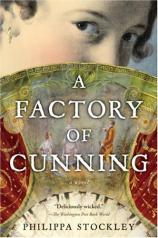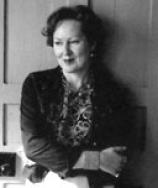Excerpt
Excerpt
A Factory of Cunning

May 4, 1784
From Sarah Beddoes
Housekeeper to the late Lady Danceacre
Hipp Street, Mayfair
Madam,
Your letter, requesting an audience with Lady Danceacre, lies before me. With regret I must inform you that her ladyship has not been alive this past month, having succumbed to a dropsical inclination that no Physick could allay. My mistress was, as you doubtless know, alone in the world except for her son, having lost her husband in the French Wars. Lord Danceacre, her sole heir, had been living abroad. He is very recently returned to London and Hipp Street is to be sold; the contents to be auctioned immediately, the day after tomorrow, once Lord Frederick has seen them. There may be things that you would wish to acquire, madam. Viewing of my Lady's effects begins tomorrow, at nine o'clock.
With great sadness in conveying this unhappy news,
Your humble servant-
~
Journal
May 4, 1784
On receiving the woeful tidings of an unmarried heir, I put off a planned exploration of the immediate neighbourhood to pursue this more profitable course. My bundled garments were shaken out and brushed. I advised Victoire to look equally to her own things, since I would not start my new life-on which our existence depended, I reminded her-with a ragamuffin trailing in tow like draggled plumage.
For supper there was a bottle of claret apiece and what food she had found-not unreasonable bread, although we were predisposed to find it heavy, a poussin, cold meats and potted shrimp. We ate heartily and retired at once; Victoire to the small room where, from the imprecations against our slatternly landlady and Flea-Bitten Scabbed Harpies, I understood that she slept badly on the floor, beneath her cloak. As the grumbling subsided I slept too, to be woken directly after midnight by an amorous kerfuffle in the street (Victoire's room faced towards the back). It was easy to hear what was going on from the enclosure of my bed; the boisterous couple might as well be frolicking alongside me, since neither bed nor windows had curtains, and the shutters had been removed-to which sorry lack I intended drawing Mrs Sorrell's attention in the morning.
All thought of sleep cancelled, I made myself comfortable with a glass of wine. Phrases that were impossible to understand, both from the coarseness of the accents and the filth they contained, floated up. Having just passed two years in exile in Holland studying English under a fine tutor, I strained to follow. There was one female voice and a series of three male, possibly four-there was a long period of rustling, provoking anxiety in case my new acquaintance had deserted her post-to which fear fresh footfalls put paid. Coins clanked, lacking the sound of silver. Then came the thud of a great parcel or sack dropt, and a repeated metallic noise that was surely spurs rasping stone, all accompanied by gutteral snatches, including Chocolate Betty, and a deal of muffled laughter.
English is a queer tongue. My own much-mourned language veneers dissolute phrases with delicate notions so that the trumpery stays hidden until, the ear having lost the words, the soul unravels their sense. By this means, insults remains misunderstood until the bestower is beyond arm's length, when mortification becomes a lonely dish. English, on the other hand, assails like a blow. No subtlety-just plain facts, like currency thumped on a table hacked from the tree.
After a bout of further importuning followed by imprecations, the front door key turned in the lock. Despite sitting bolt upright ready for all-comers (in case we were about to be molested), there was no further sound. If someone climbed the stairs, it was on velvet feet. My next impression was of Victoire, waiting to dress my hair.
~
Journal
Morning of May 5, 1784
A Story in a Sedan Chair
Lacking the means to a carriage-despite having business in view-and since there was no hurry, I decided to go to Mayfair by chair, not knowing that London is bigger than Paris and Amsterdam together. Victoire had long set off on foot to fetch answers to my outstanding letters, before making our rooms more comfortable.
My own business was at the address of the lawyers Hubert had at last sent, at Hol-born; thence to Mayfair, and the house of Lady Danceacre. As I descended Mrs Sorrell's creaking stairs to mount my winged chariot, one of the chairmen lolling in the hall let out a whistle that I ignored, so he blew another, which met the same fate.
Betty was crammed fearfully under the stairs in the narrow passage to the yard, as if she had never seen a sedan in the hall before. I told her to sweep my rooms and bring linen and a pallet for Victoire, and look lively. From her motionless gawking there was no means to judge if the words struck home. The simpering way in which she twisted her hands behind her back and thrust out her roomy chest implied that she was in Venice, with two princes in a gondola come to whisk her to a masque. I gave her a tremendous clack to the back of the head with my enamelled fan. Victoire would need to talk to Mrs Sorrell.
The runners were still staring, clutching their poles. It would be a strange thing if a French noblewoman of eight and twenty, precociously skilled in all manner of arts, could not command the admiration of a pair of British carriage dogs. Happily, one was gripped at last by the whimsical notion of helping me in.
The morning had turned out brisk, we went forth at a fair speed. Sunlight sharpened a city I had never set eyes on, which now shewed better than along the river. Yet these streets were nothing against Paris, or those Dutch gables and canals I had so recently been forced to leave behind.
The men found a pace. As they jogged easily along, my thoughts turned to the rank and fortune I had lost two years before, leaving only a clutch of jewels to ward off destitution. For two years I had forbidden myself all thoughts of the past, but now, as we turned clumsily into Threadneedle Street, I cast back.
I had narrowly escaped certain death in Paris, creeping out at night on the road for Holland, with just Victoire to go with me into darkness and the unknown. Bandaged, bundled in cloaks in case we were stopped, in a closed carriage for which I paid ten times over, since my coachman had fled, we had scarcely rested till Compiègne. A maid as sole companion for a Marquise fleeing to exile. How far fallen! Yet this maid, bound to me since childhood, was the only person who would not betray me.
Even after the passage of so many months, the memories made me burn with rage, so that it was a wonder that my own indignant heat did not propel the chair along.
I had been wrongfully implicated in a scandalous affair that rocked Paris, in which several had died. For which-though it was no fault of mine-the mob considered hanging too modest a recompense. So, fearing the worst, I had the courtyard gates of my hôtel chained. After several days when the clamour showed no sign of lessening, putting my life in increasing danger, I saw that I might be arrested. Victoire let out the news that her mistress had been siezed by a smallpox virulent enough to satisfy the bayers for blood, Old Testament zealots. Drunk with prophecy, those yelping leeches nailed handbills to my gates, calumnies torn down by my servants in the night, only to have others spring like teeth. One portrayed me as the Whore of Babylon, which was an uninspired comparison.
It is well known that a smear on a master attaches to the servants. How long would my staff stay loyal? I should soon be at the mercy of a bloodthirsty mob. Fortunately, I have a disposition that revels in rational decisions and swift action: a military mind that, in such an isolated situation, is prompt in strategy. Thus, details of the dreadful contagion increased, seemingly spilled from my household but, in truth, all done by Victoire, who went in a variety of ingenious disguises to all parts of the city, seeding false accounts of my lurid condition in coffee-house and tap-room, mercer's and hôtel yard; which seeping stories she topped up daily with bulletins of fresh agony. All Paris knew I swung between disfigurement or death.
At that time, a paper was nailed to the gate containing a ditty whose threats were real and whose phrases revealed its author. I kept the vile thing by me, to remind me to stay vigilant-until the Harpy on the Lightning Bolt took it, along with the other papers in my purse.
Terror began to master me, as if the doors might be beaten down, the windows smashed, and fire thrown in. I was insane with fear. For five days I paced my prison behind tight shutters with just one candle, afraid of showing too much light. To those for whom dragging a superior woman through mud has more glitter than gems, my seeming illness must have threatened to rob them of vengeance. Such scavengers take nothing less than death or a crippling. My situation had become precarious. If it was death or disfigurement the filth wanted, I would give them the latter, from the monstrous plague they believed me to writhe under, more terrifying to beautiful women than outright death. Immediately, false news of my rapid decline made it imperative to send the servants off.
A Factory of Cunning
- paperback: 368 pages
- Publisher: Mariner Books
- ISBN-10: 0156030675
- ISBN-13: 9780156030670







